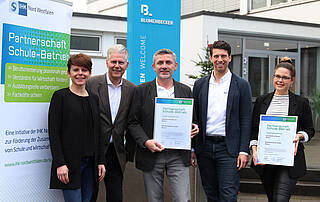
Corporate Social Responsibility
Our responsibility
We, the Blumenbecker Group of Companies, are responsible for current and future generations.
Our wish is to leave prosperity and a liveable environment for our children and our children’s children throughout the world. For this reason, responsibility in thought and action are firmly anchored in our corporate culture. Making sparing use of natural resources, work safety, care for our co-workers, compliance with the law, and engagement in our social environment – these are the fundamental principles by which we are guided. As a family-owned company, we go our own way, step by step, into a liveable and successful future for ourselves and following generations.
Environment, Ecology, Substainability
Natural resources are finite, and the eco-systems in many parts of the world are under heavy pressure. For this reason, we strive, through our actions, to contribute towards making our environment less polluted and to ensuring sparing use of energy, water and raw materials. We already began in 2010 to digitize our business correspondence. Since 2017, a new, future-pointing waste disposal concept has been in force at our Beckum site. As one of our fundamental rules, all our products are characterized by high quality and a long service life. This is a form of sustainability that is further supported by our after-sales service and the Blumenbecker spare parts service.
Responsibility in the spotlight
Paperless accounting
Better for the environment; cost savings of 60 to 80 per cent; fast, easy access to documents; transparent processes; happy staff. This is the summary after seven years of digital accountancy at Blumenbecker.
Seventy per cent of accounting in Blumenbecker companies is now digital. B+M Blumenbecker GmbH introduced paperless accounting in 2010. Since then, we have digitally captured more than one million records per year.
Good for the environment, good for Blumenbecker
Digital document processes mean less paper, less toner and fewer printers. This protects the environment and pays off. The Illentis market study from 2014 estimates the cost of a printed paper invoice at 11, - EUR. In comparison, the digital version only costs 4.50 EUR. This corresponds to a cost saving for Blumenbecker of 60 to 80 percent.
Monotonous work processes no longer necessary
In addition, work processes have become simpler and more transparent and, above all, faster, monotonous tasks such as searching for documents are no longer necessary. Employees have immediate access to all data. The auditors also access the receipts electronically. This enables fast testing and eliminates the need for on-site presence.
Step by step into the digital future
The digital future of accounting began in 2010 with the document management system D3, from which outgoing invoices, incoming invoices and delivery notes were scanned and digitally archived. In 2011, the tax authorities relaxed the legal requirements for digital accounting and created the basis for completely paperless processing. Blumenbecker's goal is to win over almost all customers and suppliers for electronic accounting by 2020.
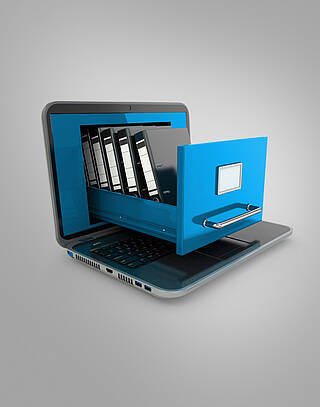
Smart Factory
Central control of energy consumption pays off - Hall areas controlled individually
The new production hall has been in use since 2014; the building control technology has been managing its energy requirements since the end of 2015, which makes it the first of Blumenbecker Group's production halls to have centrally controlled energy consumption. Decisions and choices like 'turn the heating down' or 'open the windows' are no longer up to staff, but are made by the building control technology's central control centre. Sensors throughout the hall continuously measure the ambient temperature. The data they provide is monitored by the control centre, which evaluates it in conjunction with meteorological data. If changes need to be made, the control centre adjusts the relevant area of a hall individually. For example, if the temperature is above the defined benchmark, the heating in that part of the hall is automatically turned down and the skylights open.
Lighting control and LED technology save energy
Interior lighting is also controlled, depending on levels of daylight from outside. Sensors in each area of a hall determine how much external light is entering the building and how much artificial illumination is needed. The wiring section, which requires 1,000 lux all the time, is not controlled automatically, but the conventional lighting fixtures have been replaced with LED technology. “These measures have allowed us to reduce hall temperatures by two to three degrees and use five percent less energy. The building components are very different from a couple of years ago,” says Mroczkowski. “I'm sure it wasn't easy for people to give regulation of the temperature into digital 'hands', but the results speak for themselves.”
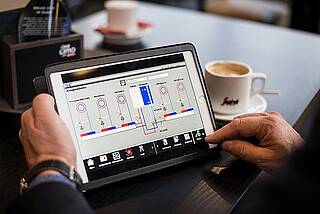
Centralized waste disposal
Four companies, 470 staff, 60 waste collection containers, 24 types of waste – Since January 2017 a new, standardised disposal system has been in force.
In the past, all four Beckum-based companies took waste disposal into their own hands. The result was that 17 different waste disposal providers bustled around the premises. Now, there is only a single provider taking care of the task. For all types of waste generated in Beckum, a unified system of waste designations and codes has been put in place which meets statutory requirements. Additionally, waste is now removed only when necessary, rather than to a fixed timetable. Containers are being emptied only once they are full.
With more wheelie bins and more collection points, people have much less walking to do. In Blumenbecker Industriebedarf GmbH’s central warehouse alone three new bins for cardboard, paper and smaller, domestic-type waste are placed in a row. Whereas even small quantities of rubbish used to have to be taken outside to the container, the bins buffer the process and do not need to be emptied into the container until they are full.
Automatic monitoring of fill levels
Modern lift-and-tip mechanisms on the pressed waste containers make emptying the bins easier and safer. The bins are rolled up to the containers, hooked into the lifting mechanism, and automatically upended and emptied. Each pressed waste container is equipped with a digital level monitor that automatically notifies the disposal provider when the container is three-quarters full, who then proceeds to remove the container without further notice being necessary.
There is also a special container for paints and varnishes as well as packaging with hazardous residues that gets picked up on a separate schedule. This way, Blumenbecker staff no longer have to worry about waste disposal.
“Disposing of waste has become a lot easier and also more ergonomic for our employees,” Dieter Mroczkowski, the head of infrastructure at B+M Blumenbecker GmbH and the person in charge of the new waste disposal scheme, sums up. “In addition, we are also in compliance with all relevant waste-related regulations because we can provide end-to-end documentation of our waste flows.”
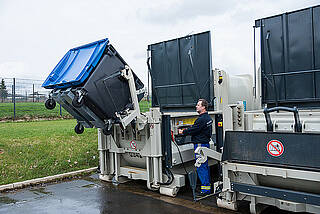
Employee welfare and work safety in the spothlight
Commitment to training
Skilled personnel are essential our future. Vocational training for young people is therefore a matter of key importance for the Blumenbecker Group. We train people for our own needs, and by doing so we lay the foundations for our future success. We offer our trainees/apprentices an interesting programme of training on the highest level. And that makes itself felt: trainees from Blumenbecker regularly number among the best finishers in their year. Our aim is to give young people an optimum start for their working lives and so provide them with the basis for a financially and socially successful future. The companies of the Blumenbecker Group offer training opportunities in a broad range of skills to match the needs of demanding markets. The spectrum ranges from classical technical apprenticeships to university sandwich courses.
Occupational health and safety
Our employees are our most important asset. Their protection and safety are important to us. The Blumenbecker Group in Germany and the Polish companies Blumenbecker Polska Sp z o.o. and Blumenbecker Engineering Polska Sp z o.o. are certified to ISO 45001, the world's first international standard for occupational health and safety.
Our aim is to minimise risks for our employees and ensure optimum prevention. Equally, this awareness, which is accredited through regular monitoring, proves that our management and work processes meet the highest safety requirements.
The management and department heads at Blumenbecker Holding personally monitor compliance with the rules at all Blumenbecker sites. A consistently low number of accidents at work proves that we are on the right track. Another important area of care for our employees is our regular health promotion campaigns. These include eye tests, neck tension measurements, vein measurements and fitness exercises for the office.
Social environment
Our sense of responsibility extends beyond our works premises. At all of our operating locations, we also pay attention to social affairs in the regional environment and support private initiatives in the fields of education and culture. We do this either directly through the individual Blumenbecker entities or indirectly through the Marianne Blumenbecker Foundation, which holds 40 % of the capital shares in our Group.
Listed below are just a few of our activities:
VDE Technology Prize
The Association for Electrical, Electronic & Information Technologies (VDE) has been awarding the technology prize since 2004. The award is given to technical innovations that have been specially designed for this prize by students from various schools.
Since then, every year we see how the pupils get enthusiastic about technology with fun and commitment and how they face the challenges in different areas such as the energy industry, digitalization and the environment.
The list of winners is long. A few years ago, the jury was impressed by the "Garden of the Future", which can mow, fertilize and water itself with the help of NXT robots from LEGO. A steerable pipe inspection vehicle ("RIF") is also among the winners. A project to collect and use wind data is also included, as well as a coffee cup washer, a weather balloon and "Rescue Rudi. This is a remote-controlled reconnaissance vehicle for rescue operations that can be operated with virtual reality goggles. It can be used when the location of the incident is not safely accessible or when there is danger for the rescue teams.
Blumenbecker is thus continuing the tradition of the Blumenbecker Prize, which used to be awarded every year for outstanding student work. "The VDE Technology Prize is aimed at a different age group, but is just as important because it introduces schoolchildren to modern electrical engineering and information technology," says Harald Golombek, managing director, explaining Blumenbecker's commitment. Martin Settele, group leader of the Competence Center Technology at Blumenbecker Automatisierungstechnik GmbH adds: "Industry is looking for the engineers of tomorrow. This is where we'll find them".
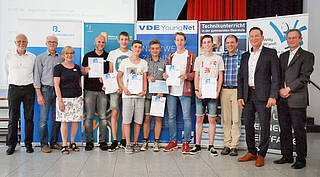
Cooperation with schools "School-Business Partnership"
To date, the vocational college Beckum, the Ennigerloh-Neubeckum comprehensive school, the secondary school in Beckum and the Fritz-Winter comprehensive school in Ahlen have been supported under cooperation agreements.
The sealed cooperation is integrated in the project "Partnership School - Company" of the Chamber of Industry and Commerce (IHK) North Westphalia. The aim of the project is to support pupils in career orientation and to help companies to secure the next generation of skilled workers.
As part of the partnership, Blumenbecker invites pupils and teachers from the cooperation schools to visit the company in order to give them an insight into the company's working and production methods and to present the training on offer. Trainees act as IHK training ambassadors, informing school classes about their professions. In addition, Blumenbecker employees support Technik AG and make offers during the schools' project week.
In view of the noticeable shortage of skilled workers, HR manager Matthias Fleischhut emphasises the necessity of not leaving any talent undiscovered: "In order to develop our company sustainably, we must already take a proactive approach to young people today and continually discover, train and promote talented and motivated young people. Only in this way can a company remain competitive", explains Matthias Fleischhut.
